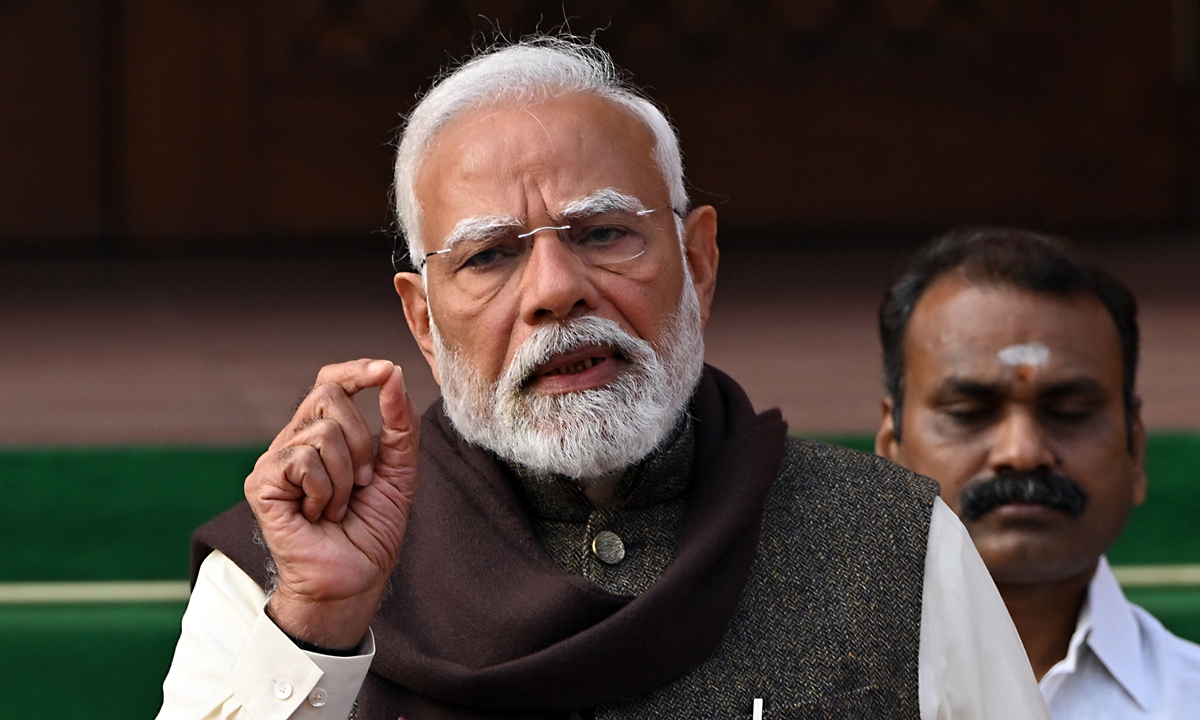(Source:Global Times,2025-02-12)

Narendra Modi Photo: VCG
At the invitation of US President Donald Trump, Indian Prime Minister Narendra Modi is scheduled to visit the US from February 12 to 13. This visit is seen as important in shaping US-India relations for the next four years. Given the America First policy of the Trump administration, the focus is on how Modi will safeguard India's interests while navigating potential diplomatic challenges.
On January 27, Trump called Modi to reiterate the importance of fair bilateral trade relations and urged India to purchase more American-made products. This has made the US invitation as a political maneuver under the guise of hospitality. It appears that the US is particularly interested in ensuring that others get things done on its own terms.
The US trade deficit against India climbed up to $36.74 billion in the 2023-24 fiscal year, making India a focal point for trade discussions. During his 2024 presidential campaign, Trump had called India a very big abuser with tariffs. Just before the meeting between Trump and Modi, Trump's top economic adviser Kevin Hassett said that India has high tariffs that lock out imports.
To address US concerns, Modi has taken several steps to strengthen ties with the US ahead of his visit.
For instance, India announced plans to reduce import tariffs in the 2025-26 fiscal year budget, particularly on products where the US has export advantages, such as motorcycles, luxury cars and smartphone parts. On the issue of illegal immigration, India has cooperated with the Trump administration to confirm the identities of approximately 18,000 Indian nationals believed to have entered the US illegally and agreed to facilitate their return. Additionally, India could expand its military procurement from the US to reduce its trade surplus.
The Trump administration demands that India further open its markets, reduce tariffs and increase procurement of US goods and services. Modi's proactive measures may help ease US concerns, which ensures his visit with some achievements if the US could agree on easing export control restrictions and postponing punitive tariffs. But any assuaging effects are short-term and in the long term, India-US relations still face many challenges.
The US' India policy could lead to increased demands, requiring India to make further concessions. For example, the immigration issue between India and the US extends beyond the settlement of illegal immigrants. Indian tech workers have been significant beneficiaries of the US H-1B visa program, with over 4.5 million Indian Americans residing in the US. However, concerns have been raised about their integration into American society, including allegations of forming exclusive groups within high-tech companies, which some argue hampers innovation.
Additionally, the influence of Hindu nationalism among new Indian immigrants and their perceived alignment with the Modi government's initiatives have drawn attention and debate in American society. These factors could make Indian Americans a potential focus of the US' immigration policies under the Trump administration.
In the view of the new US administration, the US-India Critical and Emerging Technologies Initiative is not a good deal because the framework has not provided sufficient benefits to the US. This stance could lead to potential renegotiations and thus cast a shadow over bilateral cooperation in high-tech fields.
It is expected that Modi will make all due compromises, but there is limited room for further compromises since American demands conflict with India's strategy of protecting domestic industries and promoting atmanirbhar (self-reliance). National self-esteem is also involved. For instance, the news that US military deportation and the speculative mistreatment of Indian migrants stirred an uproar in India before Modi's departure to Washington.
The year 2025 is poised to be challenging for India's foreign policy. One of the key tasks of the Modi government will be to uphold India's interests under the US pressures while avoiding diplomatic conflicts. It remains to be seen whether the Modi government will compromise further under tariff pressures, as some countries have, or take a firm stand against the US' tariff intimidation.
The author is an associate professor at the Institute of International Studies, Fudan University. opinion@globaltimes.com.cn






